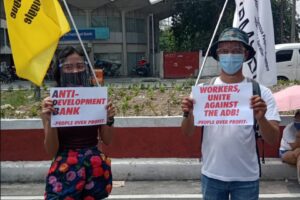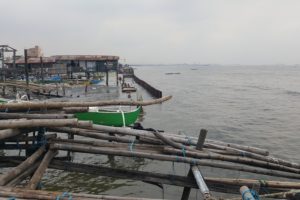In photo (© Bulatlat): People demand justice for activists massacred on “Bloody Sunday” last March 7.
IBON International enjoins the international community to condemn the rampant killings and rights violations in the Philippines, and to support people’s efforts for accountability and justice. They could amplify the calls to junk the Anti-Terrorism Act, to abolish the NTF-ELCAC, and to end military aid to the government. They could support such global initiatives as the Investigate PH to help facilitate international accountability mechanisms.
As many countries continue to reel from COVID-19, a year into the pandemic, the case of the Philippine government’s response continues to be notable for its neglect of health-based and people-centred responses. The Philippines is seeing a surge in COVID cases, overwhelmed health systems, worn out health workers, widespread poverty and hunger, closures of micro, small and medium enterprises (MSMEs) and consequent massive unemployment.
The government has recently implemented another intensified lockdown. Another lockdown that further reveals the faults of the Philippine government’s approach to the pandemic, and the reality of its authoritarian consolidation on pretexts of pandemic emergency measures. This is amid the heightened militarism and intensifying repression under the Anti-Terrorism Act and the bloody counterinsurgency programme under Executive Order 70 that have been terrorizing people’s organisations of farmers, workers, the urban poor, women and civil society.
IBON International continues to stand with the Filipino people’s demands for health-based and people-centred responses to the pandemic and the calls for accountability amid wider economic and rights crises facing majority of Filipinos today.
Following Duterte’s declarations to “ignore human rights” and kill communists, March 7 became a “Bloody Sunday”where at least nine activists were massacred—Indigenous People’s leaders and organisers in urban poor and fisherfolk communities—in joint police and military operations in the Southern Tagalog Region. Six others were also illegally arrested.
We remain concerned about government policy and budget priorities that put corporate tax cuts along with debt service, militarism, and corporate-captured infrastructure over any semblance of an adequate pandemic response. Enormous pandemic borrowings have piled up to PHP 9.8 trillion (USD 202.8 billion) by the end of 2020. The National Task Force to End Local Communist Armed Conflict (NTF-ELCAC) spearheading the bloody counterinsurgency program operates with a PHP 19 billion budget this year.
We recall with alarm that the entire month of March brought regular news of killings, illegal arrests and detention, and other rights violations across the country. Following Duterte’s declarations to “ignore human rights” and kill communists, March 7 became a “Bloody Sunday”where at least nine activists were massacred—Indigenous People’s leaders and organisers in urban poor and fisherfolk communities—in joint police and military operations in the Southern Tagalog Region. Six others were also illegally arrested.
Now, the last week of March ends with more rights violations. Union leader Dandy Miguel was shot dead in his motorcycle in Laguna province in Luzon, the night of March 28. Arrested on trumped-up charges in the last week were peasant leader Calixto Cabildo in Cagayan in Luzon, urban poor leader Connie Opalla in Bulacan also in Luzon, and rights worker Renalyn Tejero in Cagayan de Oro province in Mindanao. Rights organisation KARAPATAN decried ongoing false attempted murder charges against their chairperson, Elisa Lubi, and the secretary-general of their Southern Mindanao chapter, Jay Apiag. State forces targeted more activists in central Luzon on March 30, illegally arresting peasant leader Joseph Canlas and organizer Pol Viuya.
Civil society organisations also face threats to their operations and legitimacy over a declaration that tries to require all foreign government funding to be “cleared” with the foreign affairs department—specifically targeting CSOs who are branded as “fronts” of communists for being critical of neoliberal economic policy and repression.
Women’s rights are in an even more perilous state under Duterte, their participation and leadership are threatened and discouraged. Aside from Opalla and Tejero, both women, teacher Rosanilla Consad was arrested in Butuan City in Mindanao after her teacher’s union, the Alliance of Concerned Teachers, was branded again as a “front” of the Philippines’ communist party. Police in Bohol province illegally searched the house of peasant woman leader Leonisa Taray, an incident which threatens to lead to more harassment. Indigenous woman leader Sarah Dekdeken of the Cordillera People’s Alliance faces a cyberlibel case for criticising the police’s demolition of an IP leaders’ monument. Since their arrest in December, two women have been charged with “terrorism”under the feared Terror Law—one of whom is due to give birth this March.
Lawyers are also targeted by state attacks, with lawyers’ organisations noting that over 61 have already been killed under Duterte. This March, a lawyer was stabbed and has since been hospitalized, after participating in petitions against the Terror Law and after serving as legal counsel for the Indigenous People illegally arrested on the day of the Tumandok massacre in late 2020. A judge was also red-tagged, after dismissing trumped-up charges against two of the seven activists arrested during the 2020 International Human Rights Day. The Philippines’ highest court recently condemned such spate of killings and attacks, after lawyers’ groups urged the court to take a stronger stand, including on certain local courts’ free-handed issuance of search warrants that have resulted to rights violations.
Civil society organisations also face threats to their operations and legitimacy over a declaration that tries to require all foreign government funding to be “cleared” with the foreign affairs department—specifically targeting CSOs who are branded as “fronts” of communists for being critical of neoliberal economic policy and repression. This is in tandem with government moves to freeze assets, as recently lodged against the United Church of Christ in the Philippines’ Haran Center, whose work has long provided sanctuary for IP under threat from state forces. These further moves to block operations and support align with the policy to constrict democratic spaces in the country.
These add to the mid-March initial report of Investigate PH, a civil society-led international investigation on the rights violations in the country, which documented emblematic rights violations and concluded “a continued lack of domestic remedies and mechanisms” to address them. This is in a situation of the administration’s capture of all government branches, with certain local courts criticized for generating arrest and search warrants with trumped-up charges against activists.
In Burma, hundreds have been killed in protests against the military dictatorship since February. More than 2,000 people are currently detained, and hundreds have become victims of enforced disappearances.
In this context, IBON International enjoins the international community to condemn the rampant killings and rights violations in the Philippines, and to support people’s efforts for accountability and justice. They could amplify the calls to junk the Anti-Terrorism Act, to abolish the NTF-ELCAC, to realign its budget to people’s needs, and to end military aid to the government. They could join the calls for people-centred pandemic response—from expanded public healthcare, contact-tracing, testing, free vaccination, to living wages and hazard pay for workers, economic relief for the poor, and support for MSMEs. They could support such global initiatives as the Investigate PH, which now aims to update previous findings on the Philippine rights situation to facilitate international accountability mechanisms.
Across the world, activists, people’s organisations and civil society also face similar situations. There are currently around 59 countries that have pandemic measures that affect expression and 139 countries with measures that affected assembly. In Burma, hundreds have been killed in protests against the military dictatorship since February. More than 2,000 people are currently detained, and hundreds have become victims of enforced disappearances.
IBON International extends its solidarity to people’s movements and civil society around the world in fighting for rights, sovereignty and system change against elite rule and monopoly capitalist interests amid worsening neoliberal crises, deepening inequalities and the continuing pandemic.
Samidoun Palestinian Prisoner Solidarity Network, which advocates for freedom of the nearly 5,000 Palestinian political prisoners in Israeli jails, was also tagged as a “terrorist” organisation by the US-backed Israeli government for exposing systematic Israeli state repression. In Senegal and Haiti, protests were violently suppressed and castigated as “terrorist acts,” as people decry exacerbated economic inequalities and repression. In Haiti, the US-backed President Jovenel Moïse issued decrees since 2020 that institutionalised surveillance and repression of “hostile acts,” expanded the definition of terrorism, and heavily criminalised protests and the exercise of civil liberties.
IBON International extends its solidarity to people’s movements and civil society around the world in fighting for rights, sovereignty and system change against elite rule and monopoly capitalist interests amid worsening neoliberal crises, deepening inequalities and the continuing pandemic. We condemn state killings, the violent suppression of protests, and the use of repressive counterterrorism legislation, and assert the need to reverse these trends. More than ever, states should be held accountable for violation of people’s rights today.###



